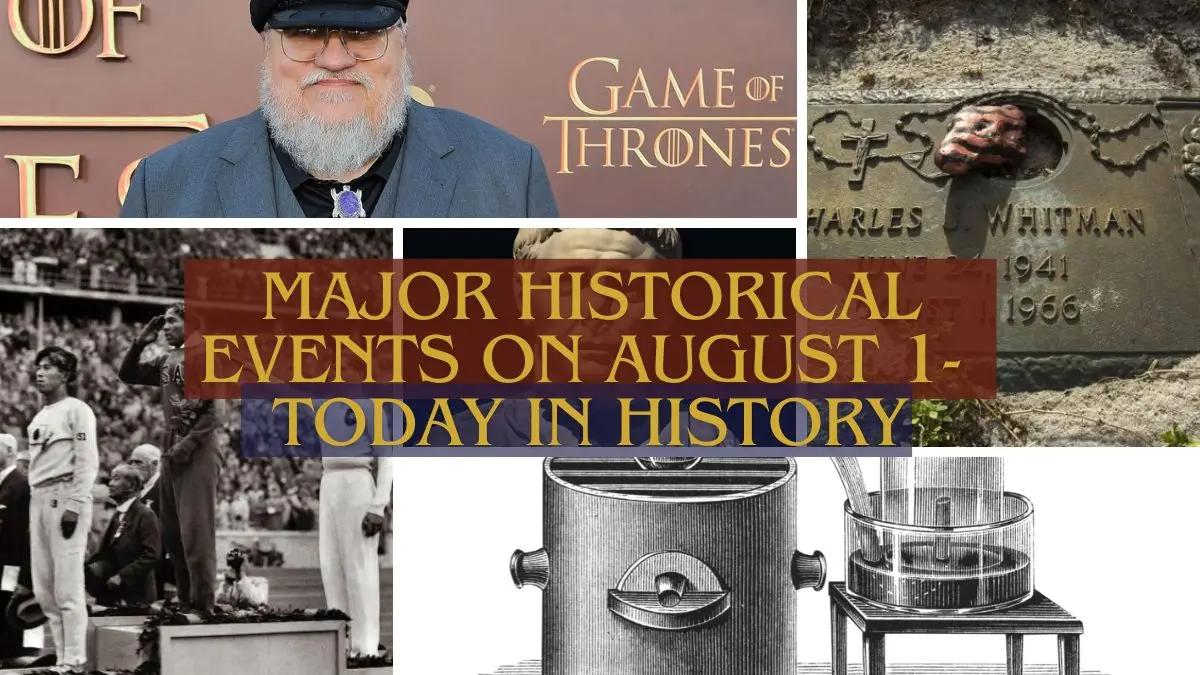Every day is a page in the vast book of human history, filled with moments that have shaped our world. Join us as we explore the major historical events on August 1, the events that have defined this day, and their lasting impact on our present and future.
Major Historical Events on August 1- Today in History
Claudius I’s Legacy: Expansion of Roman Empire – 10 BCE
Roman Emperor Claudius I, born in Lugdunum (modern Lyon, France), played a significant role in expanding the Roman Empire by extending its rule in North Africa and making Britain a Roman province, solidifying Rome’s influence in these regions.

The Assassination of Henry III: A Turning Point in French History – 1589 AD
King Henry III of France was fatally stabbed by Jacques Clément, a Jacobin friar, paving the way for his Bourbon ally, Henry of Navarre (later Henry IV), a Huguenot, to ascend to the throne, signaling a pivotal shift in French monarchy.
The End of the Stuart Era: Queen Anne’s Passing – 1714 AD
Queen Anne, the last monarch of the Stuart dynasty, died at the age of 49, marking the end of an era in England’s royal history and leading to the rise of the House of Hanover.
Lamarckism’s Origins: Jean-Baptiste Lamarck’s Birth – 1744 AD
Jean-Baptiste Lamarck, born in Bazentin-le-Petit, France, introduced the theory of Lamarckism, which posits that acquired traits can be inherited, a concept that sparked significant debate in the field of biology.
Joseph Priestley: The Discovery of Oxygen – 1774 AD
English chemist Joseph Priestley made a groundbreaking discovery by isolating oxygen in its gaseous state. This monumental achievement in 1774 laid the foundation for modern chemistry.

Herman Melville: Literary Giant of the Sea – 1819 AD
Herman Melville, an American writer born this day, gained fame for his seafaring Novels, most notably Moby Dick (1851), a profound exploration of human nature and obsession.
The Slavery Abolition Act of 1833: A Landmark in Human Rights – 1833 AD
The Slavery Abolition Act of 1833 came into effect, marking a pivotal moment in history by abolishing slavery across the British Empire. This legislation, which took years of advocacy and debate, freed over 800,000 enslaved individuals, symbolizing a significant step towards human rights and social justice on a global scale.
Colorado Joins the Union: The 38th State – 1876 AD
On this day, Colorado was admitted as the 38th state of the United States, a milestone in the expansion of the union during the period of westward expansion.
Berlin Olympics: Jesse Owens Defies Nazi Propaganda – 1936 AD
The 1936 Berlin Summer Olympics opened with Adolf Hitler’s regime attempting to showcase Aryan supremacy, but African American athlete Jesse Owens famously undermined this propaganda by winning four gold medals.

John F. Kennedy’s Literary Debut: Why England Slept – 1940 AD
John F. Kennedy’s Why England Slept, a critical examination of Britain’s pre-World War II military preparedness, was published and became a best seller, marking his entry into the literary world.
Anne Frank’s Final Diary Entry: A Testament to Hope – 1944 AD
Anne Frank, a young Jewish girl hiding from Nazi persecution in the Netherlands, made her final diary entry on this day, leaving behind a poignant record of hope and human resilience in the face of unimaginable adversity.
Warsaw Uprising: A Brave but Costly Resistance – 1944 AD
The Warsaw Uprising began as Polish resistance forces attempted to liberate the city from German occupation before the Soviet army’s arrival, but after running out of supplies, the Poles were forced to surrender in October, resulting in heavy casualties.
The University of Texas Tragedy: Charles Whitman’s Rampage – 1966 AD
Charles Whitman, a former marine, committed one of the deadliest mass shootings in U.S. history by firing from the University of Texas clock tower, killing 14 and wounding 31 others, an event that shocked the nation.

Vigdís Finnbogadóttir: A Pioneer for Women in Leadership – 1980 AD
Vigdís Finnbogadóttir was elected president of Iceland, becoming the first woman in the world to be democratically elected as head of state, breaking new ground for women in global politics.
The Birth of MTV: A New Era in Music – 1981 AD
MTV launched with the airing of Video Killed the Radio Star by the Buggles, revolutionizing the music industry by popularizing the music video format and shaping pop culture for decades.
Mike Tyson’s Unification: The Heavyweight Champion – 1987 AD
Mike Tyson achieved a historic milestone by defeating Tony Tucker, becoming the undisputed heavyweight champion recognized by all three major boxing organizations, solidifying his legacy as a boxing icon.
A Game of Thrones: George R.R. Martin’s Epic Begins – 1996 AD
George R.R. Martin published A Game of Thrones, the first book in the A Song of Ice and Fire series, which would go on to become a cultural phenomenon, influencing fantasy literature and television.

The Passing of King Fahd: A Change in Saudi Arabia – 2005 AD
King Fahd of Saudi Arabia, who had reigned since 1982, died at age 82, and was succeeded by his half-brother ʿAbd Allah, marking a transition in the kingdom’s leadership.
Also Read: Major Historical Events on July 31- Today in History



